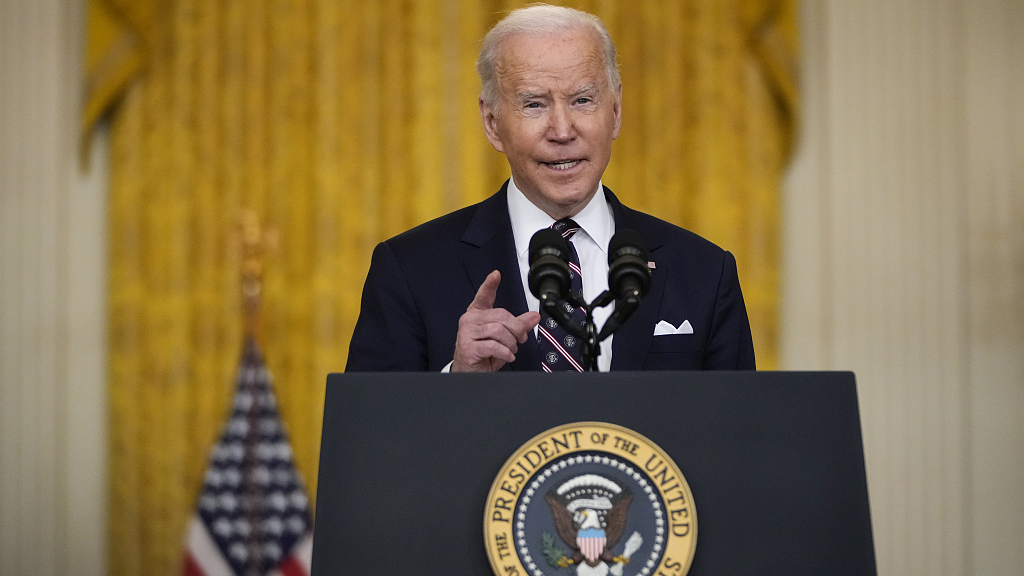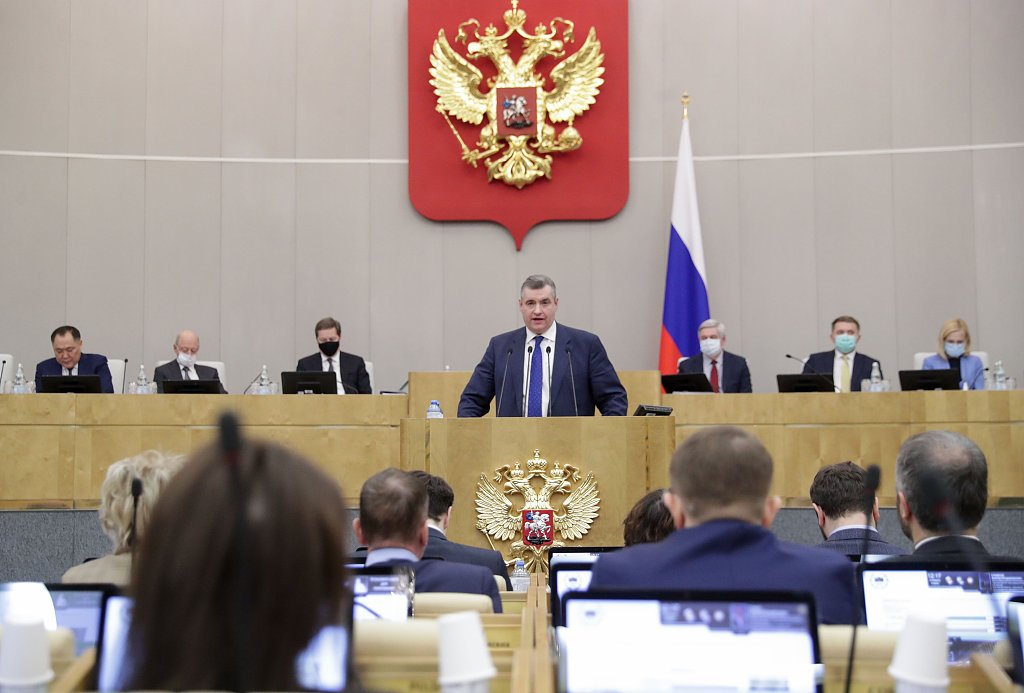
U.S. President Joe Biden delivers remarks on developments in Ukraine and Russia, and announces sanctions against Russia, from the East Room of the White House in Washington, D.C., February 22, 2022. /CFP
U.S. President Joe Biden delivers remarks on developments in Ukraine and Russia, and announces sanctions against Russia, from the East Room of the White House in Washington, D.C., February 22, 2022. /CFP
Editor's note: Bradley Blankenship is a Prague-based American journalist, political analyst and freelance reporter. The article reflects the author's opinions and not necessarily the views of CGTN.
Russian President Vladimir Putin on February 21 recognized the "Donetsk People's Republic (DPR)" and "Luhansk People's Republic (LPR)" in Ukraine's Donbas region as independent states in dramatic fashion. He also announced the potential deployment of peacekeeping forces to those areas and, the following day, asked his country's parliament for permission to use military force outside of Russia.
There were several factors used to justify this, including protecting Russian citizens in Donbas, forcing a renegotiation of the 2014 Minsk Accord (and its follow-up in 2015) that Moscow sees as ignored by the Ukrainian side, and actions necessary to help stabilize any more violence that could take place on the frontline, which has already led to flows of refugees into Russia.
For its part, the United States, which has been a driving force behind this conflict with its geopolitical ambitions of NATO's eastward expansion, labeled Russia's move "an invasion" after initially hesitating to do so. This will be the impetus for further developments, which will surely include new sanctions against Russia and also more "lethal aid" to Ukraine.
What's ironic about this, however, is that the United States has a long track record of supporting separatist forces and "breakaway" republics around the world. For example, Washington has been a steadfast supporter of Kosovo's independence from Serbia, which is a contentious issue for the international community and especially Europe, as well as a major supporter of separatist forces in China's Taiwan.
Washington has its largest military base in the Balkan region of Kosovo, which it constructed without consent from Belgrade. It was also revealed to have deployed troops to Taiwan at some point without permission from Beijing, and recently approved a $100 million arms deal to the island, which prompted China to sanction major American military contractors.
For Washington to cry foul over Russia's recognition of the DPR and LPR and going so far as to label what transpired as an invasion while having long supported even more provocative policies around the world is deeply hypocritical.
It shows that the United States only supports those movements which support its geopolitical ambitions while denouncing the rest as lawless rebels, whether that actually be the case or not. And it would be even more ironic for Washington to now adopt some kind of "One Ukraine" principle while, for example, routinely trampling the one-China principle.
These bold-faced contradictions rooted in American exceptionalism, however, are not the Western consensus. As stated before, this frontline in Donbas has been ongoing for some eight years and both republics have claimed independence for quite a while. It is perhaps a shock that Putin's recognition of the Donbas republics happened in this context, but it had been brewing for quite some time and many in Europe anticipated it.

The State Duma unanimously ratifies the treaties on friendship, cooperation and mutual assistance with the Donetsk and the Luhansk Peoples Republics (DPR and LPR) submitted by Russian President Vladimir Putin, February 22, 2022. /CFP
The State Duma unanimously ratifies the treaties on friendship, cooperation and mutual assistance with the Donetsk and the Luhansk Peoples Republics (DPR and LPR) submitted by Russian President Vladimir Putin, February 22, 2022. /CFP
Some European leaders closer to the Washington orbit have jumped on board to label Russia's actions an invasion while others have been more cautious, including EU foreign policy chief Josep Borrell. He said in Paris at a press conference, "I wouldn't say that (it is) a fully fledged invasion, but Russian troops are on Ukrainian soil" per the EU's view.
Given this complicated statement, it is hard to speculate on how things will develop from here – though an immediate triggering of a major war is unlikely. What's clear is that Russia has demarcated the frontline in Donbas that has de facto existed for these eight years. There will undoubtedly be sanctions from Washington as well as from the EU, but Russia doesn't fear this possibility and feels its economy is insulated against such actions.
In the long run, this will force serious reflection by European leaders for the existing security architecture on the continent, which is something Russia wants since it sees the status quo – and the potential of Ukraine joining NATO, which triggered this current iteration of the Ukraine crisis – as untenable. It's not hard to see why Moscow feels that way with the potential for a hostile military alliance at its doorstep.
This reflection on where Europe (and the world) stands was forced by the Russian side by merely taking a page from the American playbook out of existential fear. As the world's premier military power, the United States has a responsibility to set the tone for international relations and create a more stable security order by using its power responsibly.
That Russia had to resort to recognizing "breakaway" republics on this issue – something it could have done for eight years but chose not to until it saw the existential threat as too great – is a sign that the principles of international relations and diplomacy are breaking down. The onus for this lies on Washington for its reckless ambition, including its cherry-picked support of separatist forces around the world.
(If you want to contribute and have specific expertise, please contact us at opinions@cgtn.com.)

